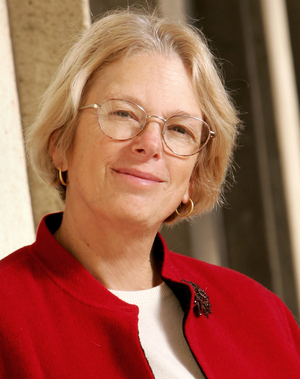
By Andrew Cohen
Having studied digital technology’s impact on legal regimes for 25 years, Berkeley Law professor Pamela Samuelson took a natural interest in the Google Book Settlement. Taking a lead role in raising concerns about it, however, wasn’t Plan A.
“I had plenty of other things to work on,” she says. “It wasn’t something I necessarily wanted to do, but it became clear that the issues and implications were too important to ignore.”
The proposed settlement—which would govern Google’s effort to digitize millions of books and offer them online—faces growing critical scrutiny from academic authors and copyright experts, as well as from the U.S. Department of Justice’s Antitrust Division. A pioneer in digital copyright law, intellectual property, cyberlaw, and information policy, Samuelson has emerged as a leader in pushing for Google to make public commitments that address the many concerns critics are raising about the settlement.
If approved, the settlement would end two copyright infringement lawsuits: one brought by the Author’s Guild on behalf of authors whose books Google was scanning to index them and make snippets available, and another by several members of the Association of American Publishers.
In a letter to the presiding judge, Samuelson claimed the settlement would essentially grant Google an exclusive compulsory license to the digital versions of millions of books—without sufficient safeguards against price gouging and user privacy—which might negatively “shape the future of reading, research, writing, and publication practices for decades to come.”
Signed by 16 university professors, Samuelson’s letter warned of “widespread ignorance about the agreement and its implications for the future of scholarship and research.” In response, Judge Denny Chin pushed back the settlement approval date by four months with a hearing to determine its fairness set for October 7. Samuelson is using that time to ramp up awareness among her colleagues.
Spreading the Word
“The agreement is 134 pages long and very complicated,” says Samuelson, co-director of the Berkeley Center for Law & Technology and founder of the Samuelson Law, Technology & Public Policy Clinic. “It’s not something that magically draws you in. But when you pore over it, you recognize there are some dangers involved.”
Google, which has scanned millions of books contained in major university libraries, sees the settlement as a mechanism to compensate authors and publishers for including digital copies of their work in a massive database. It gives Google a license to commercialize all books in copyright unless their rights holders come forward to object, including “orphan” works whose copyright owners are not easily found.
Authors now have until September 4 to opt out of the settlement and preserve a right to sue Google. But Samuelson calls that option “impractical” because an author’s works would disappear entirely from what may become the only meaningful and searchable resource of digital books. “Google’s market power makes this an offer people can’t refuse,” she says.
Google claims the public will benefit from a huge expansion of access to books. It would reportedly pay 63 percent of book revenues to a registry that distributes proceeds to authors and publishers, $34.5 million to create the registry, and $45 million or more into a settlement fund that pays copyright holders at least $60 for each book scanned.
But settlement opponents claim the agreement would create unprecedented monopoly privileges with daunting long-term implications. “What Google is getting is in effect a privately negotiated license to every book published in the U.S.,” says Samuelson. “That’s pretty broad.”
One of her main concerns is that millions of orphan works could enable Google to decide what books are available to the public and at what cost. Roughly five million of the seven million-plus books Google has scanned are reportedly in copyright but out of print, and the current settlement lets Google sell these digital books—along with access to its database and book-linked advertising.
A Push for Privacy Protection
Google’s lack of competition, argues Samuelson, could also jeopardize equity of access to information, patron privacy, and intellectual freedom. She says rights-holders are the only people whose information will be kept confidential, and that Google will be able to monitor what people are reading and for how long.
Academic authors have written “most of the books in play here,” notes Samuelson, and “their interests aren’t actively represented by the Author’s Guild. A norm of research communities is the right to read anonymously. The fact that no privacy protections were envisioned about individual reading habits and what people are buying is quite distressing.”
Meanwhile, the Justice Department is probing whether the agreement violates antitrust regulations. It recently sent civil investigative demands to Google, which could signal a move toward blocking or forcing renegotiation of the settlement.
“Right now there’s no way to know how this will affect the case,” says Samuelson. “But the fact that the Justice Department is investigating indicates a range of potential problems if the settlement goes through as is.”